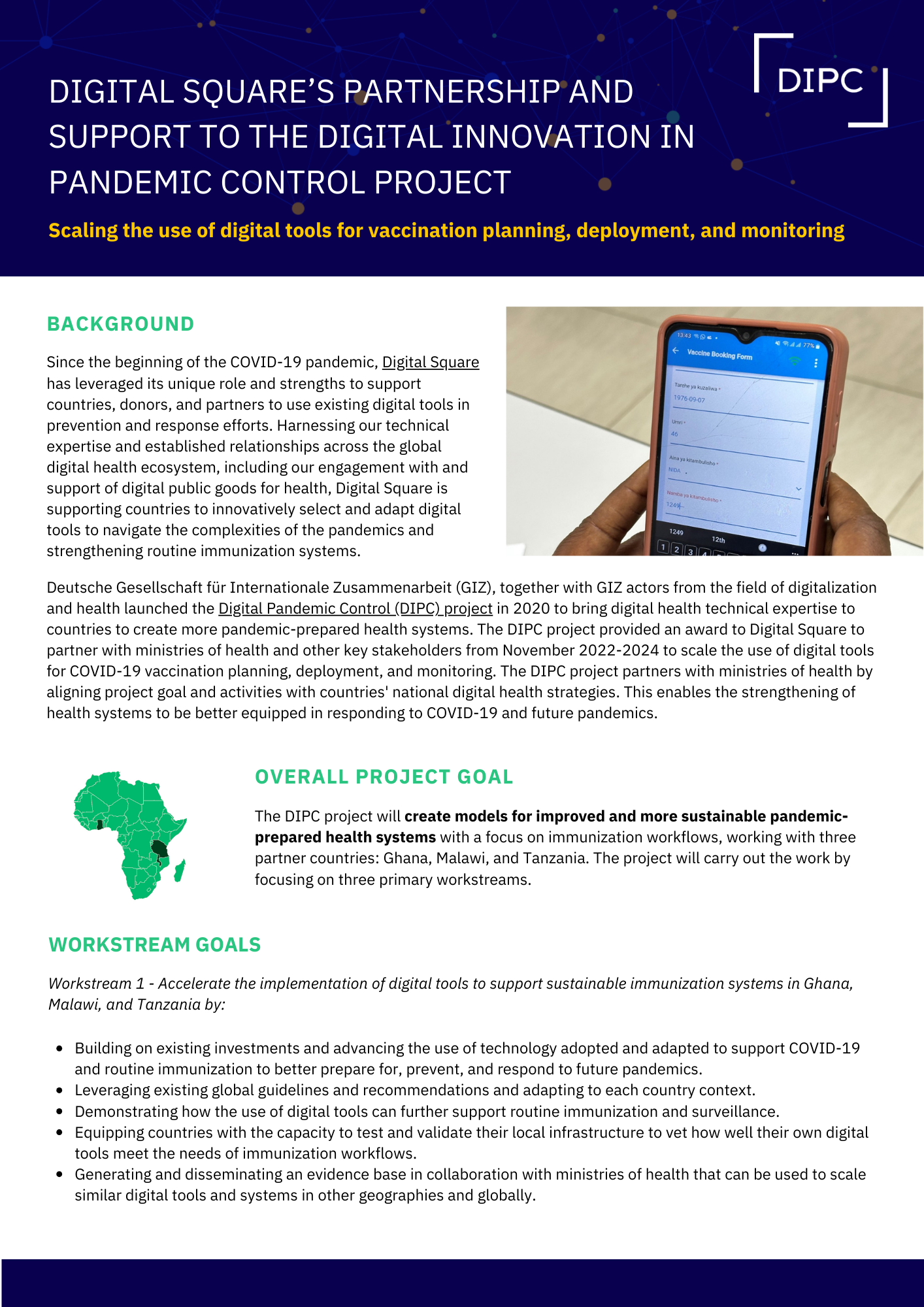Project overview
Read DIPC project fact sheet.
Countries face significant challenges when building digital immunization solutions, especially during pandemics. Fragmentation inhibits secure and interoperable data exchange across systems. A lack of resources impedes local stakeholders from sustaining these systems and easily adapting to changing healthcare needs—as was the case for many countries during the COVID-19 pandemic.
Through the Digital Innovation in Pandemic Control (DIPC) project, the Deutsche Gesellschaft für Internationale Zusammenarbeit (GIZ) and Digital Square at PATH are addressing these existing challenges by partnering with ministries of health (MOH) in Ghana, Malawi, and Tanzania to select and adapt robust digital tools to strengthen immunization systems. The project launched in November 2022 and will run through 2025. All digital tools selected will be nationally scalable and interoperable.
Ghana
The Digital Square DIPC team partnered with Ghana Health Service (GHS) to better understand the landscape of tools currently used in Ghana's immunization health domain. This landscaping resulted in the publication of a country profile, which provides an overview of current digital systems that support immunization used in Ghana. The profile also outlines priorities so that Ghana—led by the direction of GHS and its existing governance mechanisms and supported by other key stakeholders—can use the findings to inform its journey to develop and operationalize interoperable digital systems that support immunization from end to end. These efforts will unify Ghana’s digital health ecosystem and bolster effective vaccine planning and service delivery with the goal of increasing high-quality vaccination services.
DIPC Activities in ghana
Enhance the DHIS2 e-Tracker so it can serve as Ghana's electronic immunization registry for COVID-19 and routine immunization.
Strengthen the capacity of health workers by updating content for the GHS eLearning platform so that system users can effectively build their knowledge of digital systems to support immunization.
Support interoperability of current digital immunization tools by providing detailed requirements for an interoperability layer (IOL) and evaluating potential software systems that best meets GHS needs.
DIPC Ghana Resources
Brief (2025): Women in Digital Health Event in Ghana: Empowering future female leaders
Brief (2024): Digital Innovation in Pandemic Control: Ghana
Blog (2024): Inspiring future female digital health leaders in Ghana
Report (2024): Digital Adaptation Kit for Immunization (DAK): Ghana
Report (2023): Health Data Ecosystem Mapping: Ghana
Blog (2023): Strengthening Ghana's Immunization Systems: A Step Towards Digital Innovation and Pandemic Control
Malawi
The Digital Square DIPC team partnered with the Malawi Ministry of Health's (MOH) Digital Health Division (DHD) and Expanded Programme on Immunization (EPI) to better understand the digital systems currently used to support immunization in Malawi. This landscaping resulted in the development of a country profile, which outlines key digital systems currently supporting immunization. Findings highlight that though the MOH is experiencing rapid growth in the development and adoption of these mobile and web-based digital tools, a number of the existing systems are not integrated and/or interoperable, leading to inefficiencies and a lack of accurate data.
dipc Activities in Malawi
Localize the new Digital Adaptation Kit for Immunization (DAK) so that health care is administered according to clinical guidelines that increase quality of care. To do this, DIPC adapted a generic DAK for immunization into a localized DAK using the same principles and format of WHO’s standards-based, machine-readable, adaptive, requirements-based, and testable (SMART) Guidelines.
Develop an electronic immunization registry (EIR) as a module within the Malawi Healthcare Information System (MaHIS).
Strengthen the capacity of MOH partners to manage and adapt the EIR so it can be locally sustained.
DIPC Malawi Resources
Brief (2024): Digital Innovation in Pandemic Control: Malawi
Report (2024): Digital Adaptation Kit for Immunization (DAK): Malawi
Report (2023): Health Data Ecosystem Mapping: Malawi
Blog (2023): Developing an electronic immunization registry in Malawi — Digital Square
Tanzania
The Digital Square DIPC team partnered with the Tanzania Ministry of Health (MOH) to better understand the landscape of systems currently used in Tanzania's immunization health domain. This landscaping resulted in the publication of country profile, which provides an overview of current digital systems that support immunization used in Tanzania. As part of the ecosystem mapping exercise, end users of the digital systems provided specific recommendations on features and interventions they would like to see added to the immunization registry, including incorporation of COVID-19 and all forms of adult immunization. Tanzania has a clear vision for its national digital health strategy and how existing tools can be adapted, enhanced, and scaled up to support the functional components of immunization.
DIPC Activities in Tanzania
Localize the Digital Adaptation Kit for Immunization (DAK) for Tanzania, based on the WHO SMART Guidelines Digital Adaptation Kit format, so that health care is administered according to the national clinical guidelines to increase quality of care.
Support the enhancement of the immunization module within the centralized Government of Tanzania Health Operations Management Information System (GOTHOMIS).
Provide capacity strengthening to developers from the MOH, local entrepreneurs, and other government agencies focused on Fast Healthcare Interoperability Resources (FHIR) to support data exchange and interoperability.
DIPC Tanzania resources
Report (2024): Digital Adaptation Kit for Immunization (DAK): Tanzania
Blog (2024): Capacity strengthening to support women in data and digital health: Wahida’s story
Report (2024): Health Data Ecosystem Mapping: Tanzania
Blog (2023): Tanzania's path to pandemic preparedness: Strengthening immunization digital health systems
Localizing common requirements for immunization digital systems: Experience from the DIPC project
Learn more about the DIPC project’s efforts to develop localized Digital Application Kits (DAKs) for each country in line with the WHO Digital Adaptation Kit for Immunization. Download fact sheet (PDF).
Developing an immunization product suite
As part of the DIPC project, Digital Square also worked with global goods partners to develop a global goods immunization product suite to support immunization programs. Using FHIR-standardized interoperable components and integrations such as OpenSRP2, DHIS2, RapidPro, and OpenHIM, the product suite aims to improve vaccine delivery, health worker support, and data collection and reporting, particularly in low- and middle-income countries.
Digital Square’s role
Since the beginning of the COVID-19 pandemic, Digital Square has leveraged its unique role and strengths to support countries, donors, and partners to use digital tools in prevention and response efforts. Harnessing our technical expertise and established relationships across the global digital health ecosystem—including our engagement with and support of digital global goods for health—Digital Square supports countries to select and adapt digital tools to help prepare for any future pandemics by strengthening digital systems for immunization.
Learn more about our other work in pandemic preparedness.



